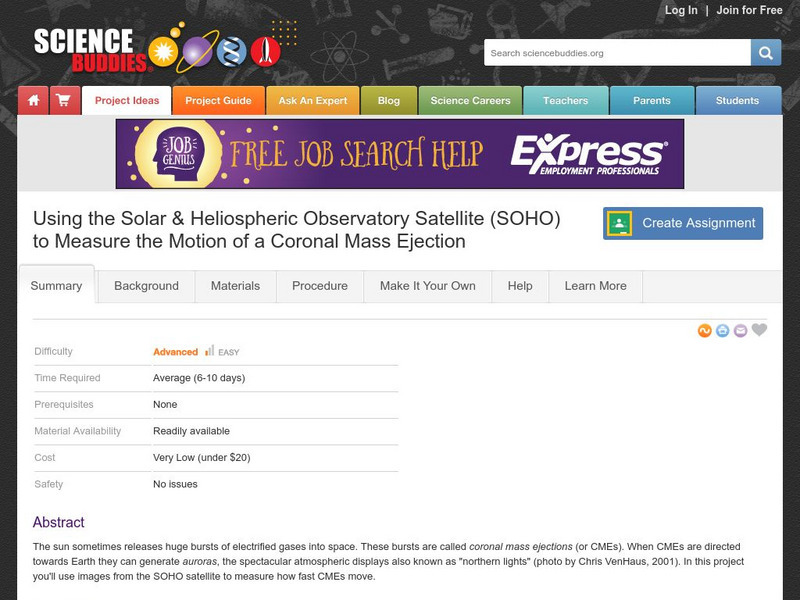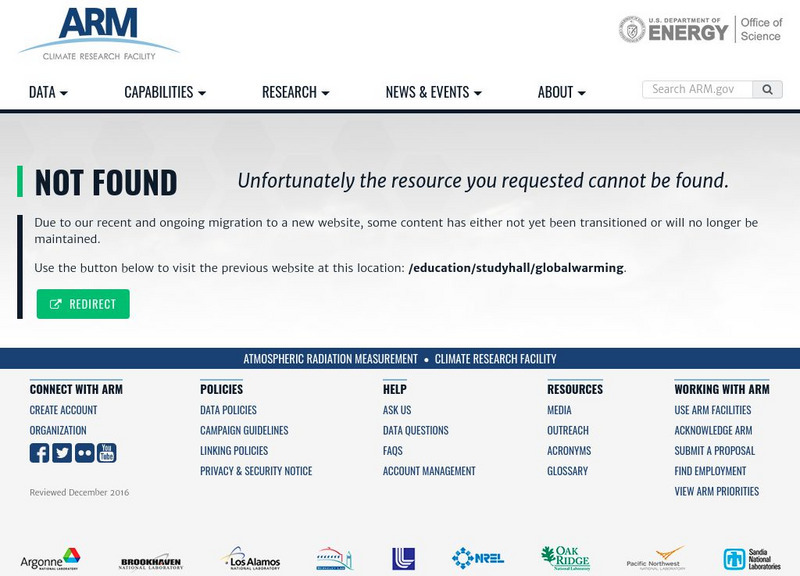Hi, what do you want to do?
NASA
Space Math: Nasa Satellite "Sees" Carbon Dioxide [Pdf]
Using this map from NASA you can calculate the concentrations of carbon dioxide in the atmosphere. Solve the four problems and you will see how concentrations are spread across the globe and where there are regional differences.
NASA
Nasa: Weather
Though we live on the surface of the Earth, we actually live at the bottom of an ocean of air. Dynamic layers of air interact with the Earth's surface and the Sun's energy to produce the phenomenon of weather. The atmosphere is...
NASA
Nasa: Aerodynamics Index
Are you studying or teaching Aerodynamics? This page acts as an index to all the terminology related to this topic. Clicking on any title will open a page with a colored slide and a scientific explanation of the contents. Animated,...
Science Buddies
Science Buddies: Observatory Satellite Measures Motion of Coronal Mass Ejection
The sun sometimes releases huge bursts of electrified gases into space. These bursts are called coronal mass ejections (or CMEs). When CMEs are directed towards Earth they can generate auroras, the spectacular atmospheric displays also...
Other
Lehigh University: Climate Change
An inquiry-based science unit for middle school students centered on weather and climate. The lessons integrate technology and lab activities while teaching about Earth system energy balance, greenhouse gases, paleoclimatology, and how...
King's Centre for Visualization in Science
Explaining Climate Change: Lesson 2: Is Climate Change Happening?
This is the second lesson in a series of learning modules on the topic of climate change. It examines what climate change is, how it relates to greenhouse gas concentrations over time, and temperature trends. Includes comprehension...
Other
Breathing Earth
Breathing Earth layers data about rates of carbon dioxide emission along with birth and death rates onto a map of the world in a real-time simulation of one of the principal greenhouse gases in the Earth's atmosphere, CO2.
PBS
Pbs Learning Media: Understanding Air: Climate Change and Modeling Combustion
In this lesson, students learn about the components of air and the chemical reactions that release carbon dioxide into the atmosphere and explore the connection between carbon dioxide, climate change, and environmental health.
University Corporation for Atmospheric Research
Ucar: Co2: How Much Do You Spew?
Students analyze the energy consumption of a hypothetical household to determine the amount of carbon dioxide they are adding to the atmosphere each year.
NASA
Nasa: Beginner's Guide to Aerodynamics
Includes exhaustive information and a wealth of activities pertaining to aerodynamics and the physics of flight.
Other
Climate Gateway: What Is Climate Change?
This ClimateGateway.com site provides information on what climate change is as well as the factors that affect global climate.
TeachEngineering
Teach Engineering: Air Pollution
Students are introduced to the concept of air quality by investigating the composition, properties, atmospheric layers and everyday importance of air. They explore the sources and effects of visible and invisible air pollution. By...
Energy4Me
Energy4me: Air Quality
Find out how the production of natural gas and oil can result in the release of hydrocarbons and other emissions into the air.
Other
Arm Program's Education Center: Global Warming
An all purpose site with something for everyone. Learn about global warming and climate change, ask a scientist, take a quiz, or get a lesson plan!





![Space Math: Nasa Satellite "Sees" Carbon Dioxide [Pdf] Unknown Type Space Math: Nasa Satellite "Sees" Carbon Dioxide [Pdf] Unknown Type](https://static.lp.lexp.cloud/images/attachment_defaults/resource/large/FPO-knovation.png)







